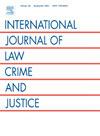缓冲还是增强?关于自我控制在网络欺凌行为中调节作用的性别差异的探索性研究
IF 1.4
4区 社会学
Q3 CRIMINOLOGY & PENOLOGY
International Journal of Law Crime and Justice
Pub Date : 2024-09-30
DOI:10.1016/j.ijlcj.2024.100699
引用次数: 0
摘要
尽管人们越来越关注自我控制在犯罪及其相关因素之间的调节作用,但对这一作用中的性别差异仍未进行深入探讨。本研究探讨了网络欺凌背景下自我控制调节作用的性别差异。我们研究了自我控制是否能调节通过移动设备实施的网络欺凌行为与两种网络欺凌诱因之间的联系:1) 网络欺凌受害情况和 2) 与有过网络欺凌行为的同伴之间的关联,以及这种调节作用是否因性别而异。对 244 名韩国大学生进行的托比特回归分析表明,在女大学生中,自我控制能力显著调节了网络欺凌与与曾有过网络欺凌行为的同伴的关联之间的联系。这种关系在自我控制能力较强的女生中更为明显,而在男生中则不然。女性自控力的增强效应明显大于男性。本文还讨论了性别差异的影响及其与网络欺凌的相关性。本文章由计算机程序翻译,如有差异,请以英文原文为准。
Buffering or enhancing? An exploratory study of gender differences in the moderating role of self-control in cyberbullying perpetration
Despite growing attention to the moderating role of self-control in the association between crime and its correlates, gender differences in this role remain underexplored. This study explored gender differences in the moderating role of self-control in the context of cyberbullying. We examined whether self-control moderates the links between cyberbullying perpetration via mobile devices and two cyberbullying igniters: 1) cyberbullying victimization and 2) association with peers having prior cyberbullying behaviors, and whether this moderating role varies across genders. A tobit regression analysis of 244 South Korean college students showed that among female students, self-control significantly moderated the link between cyberbullying and association with peers having prior cyberbullying behaviors. The relationship was stronger among female participants with higher levels of self-control, but not for male ones. The enhancing effect of self-control was significantly greater for females than males. The implications of gender differences and their relevance to cyberbullying are also discussed.
求助全文
通过发布文献求助,成功后即可免费获取论文全文。
去求助
来源期刊
CiteScore
2.70
自引率
0.00%
发文量
25
审稿时长
47 days
期刊介绍:
The International Journal of Law, Crime and Justice is an international and fully peer reviewed journal which welcomes high quality, theoretically informed papers on a wide range of fields linked to criminological research and analysis. It invites submissions relating to: Studies of crime and interpretations of forms and dimensions of criminality; Analyses of criminological debates and contested theoretical frameworks of criminological analysis; Research and analysis of criminal justice and penal policy and practices; Research and analysis of policing policies and policing forms and practices. We particularly welcome submissions relating to more recent and emerging areas of criminological enquiry including cyber-enabled crime, fraud-related crime, terrorism and hate crime.

 求助内容:
求助内容: 应助结果提醒方式:
应助结果提醒方式:


